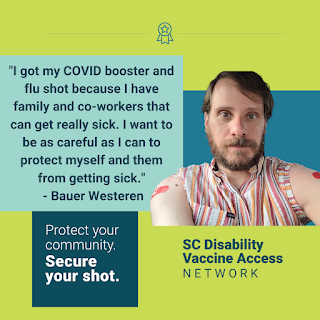Bivalent- What's Up with the New Boosters?
In September 2022 the FDA and CDC approved a new, updated booster for people over age 12 to fight COVID-19. The new booster will fight COVID-19 variants that can make you very sick. You need your new booster to stay healthy this fall and winter!
Able SC is hosting a barrier-free clinic for COVID-19
& flu shots on October 7
Register for Able SC's Clinic Here!
If it's been 2 months since your last COVID-19 dose or booster, it's time to get the NEW, updated booster shot!
If you do not have your updated booster shot, you are not protected from COVID-19, severe sickness, and death.
Keep reading to learn more about it.
*****
What is the difference between bivalent and monovalent shots?
- A monovalent vaccine has ingredients that fight one strain of a virus. The COVID-19 monovalent vaccines and boosters were made to fight the original COVID-19 virus.
- A bivalent vaccine has ingredients that fight two strains of a virus. The original COVID-19 vaccines were monovalent. Monovalent means they fight only one mRNA strain of the COVID-19 virus. The updated COVID-19 vaccine boosters contain MRNA from 1)The original SARS-CoV-2 virus, and 2) a strain of the Omicron variant to fight against BA.4 and BA.5.
Why is a bivalent booster important?
- The updated boosters will provide more protection against the COVID-19 virus. They provide more protection because they have two mRNA strains that teach your body how to fight the virus. Scientists use mRNA from the original COVID-19 virus. The mRNA from the original COVID-19 virus increases the protection you get from your first vaccines. They add mRNA that fights the BA.4 and BA5 variants. The BA.4 and BA5 variants are making most people sick right now. Scientists expect these variants will continue infecting people into the fall and winter of 2022.
Does the bivalent booster have different side effects?
- Side effects from the bivalent boosters are similar to the side effects from the original monovalent vaccines.
- Most side effects are redness and swelling where you got your vaccine. You may also have fatigue, headache, fever, and joint pain.
Who should get a booster shot?
People 5 years and older should get at least 1 booster shot after completing their COVID-19 vaccine primary series.* Your primary vaccine series is either one shot of J&J or 2 shots of Moderna, Pfizer, or Novavax vaccines.
- *People ages 5 to 11 that got the Moderna vaccine for your primary vaccine series are not eligible for a booster shot.
You should get the new bivalent booster shot if you:
- Are 12 years or older.
- It has been 2 months or longer since you had your last dose.
You should get the monovalent booster shot if you:
- Are between the ages of 5 and 11
- Got the Pfizer vaccine for your primary vaccine series
- It has been at least 5 months since your 2nd dose
Which booster shot(s) should I get?
Children and Youth ages 5 to 17:
- Children 5 years old and older should get a single booster shot.
- If you are 5 to 11 years old and got the Pfizer vaccine for your primary vaccine series, you can get the Pfizer monovalent booster shot.
- If you are 12 to 17 years old, you can get the Pfizer bivalent booster shot.
- If you are under 12 and got the Moderna vaccine for your primary vaccine series, you should not get a booster shot.
What if my child already got 1 monovalent booster shot?
If it has been 2 months or longer since their last shot, and they are at least 12 years old, then your child is eligible to get the bivalent booster.
What if my child has a weakened immune system and already got 2 monovalent booster shots?
If it has been 2 months or longer since their last shot, and they are at least 12 years old, then your child is eligible to get the bivalent booster.
People ages 18 and older:
If you are 18 or older, you can get the bivalent booster if it has been 2 months or longer since
- You finished your primary vaccine series
- You got a booster shot
There are 2 bivalent boosters, one is Pfizer, and the other is Moderna.
- It does not matter which brand you get.
- For your primary vaccine series, your options are Pfizer, Moderna, J&J, or Novavax.
I already got the monovalent booster shot. Can I still get a bivalent booster?
If it has been at least 2 months since your last booster shot, you can get the Bivalent booster.
I already got 2 doses of the monovalent booster shot. Can I still get a bivalent booster?
- If you are 50 years old or older or have a moderately or severely compromised immune system, you may have already gotten 2 monovalent booster shots.
- As long as it has been at least 2 months since your last booster, you are eligible for the new bivalent booster.
- Note: If you had to get a certain vaccine because you are allergic to one of the ingredients in other COVID-19 vaccines, then talk to your doctor about booster options.
When should I get my booster shots?
- When you should get your booster shot depends on your age and when you finished your primary vaccine series or got your last dose.
- Children ages 5 to 11 years old, who got the Pfizer vaccine, can get the the Pfizer monovalent booster 5 months after finishing their primary vaccine series.
- People 12 years old and older can get the bivalent booster 2 months after finishing your primary vaccine series or getting your last booster.
- If you have had an allergic reaction to a COVID-19 vaccine ingredient in the past, then your doctor may tell you to not get that vaccine.
- If you have been instructed not to get one type of COVID-19 vaccine, you may still be able to get another type.
Talk to your doctor to find out which
COVID-19 vaccine booster is best for you.
Booster shots add the protection you need. Getting your vaccine and booster shots at the prescribed time will help you stay up-to-date on your COVID-19 vaccine.
Contact our Vaccine Access Helpline at 1-800-787-6046.
Sources:
Centers for Disease Control and Prevention. (2022, August 11). Symptoms. Centers for Disease Control and Prevention. Retrieved August 22, 2022 from https://www.cdc.gov/coronavirus/2019-ncov/symptoms-testing/symptoms.htm
Centers for Disease Control and Prevention. (2022, July 20). People with Disabilities. Centers for Disease Control and Prevention. Retrieved August 23, 2022 from https://www.cdc.gov/ncbddd/humandevelopment/covid-19/people-with-disabilities.html
Centers for Disease Control and Prevention. (2022, July 11). Patient Tips: Healthcare Provider Appointments for Post-COVID Conditions. Centers for Disease Control and Prevention. Retrieved June 8, 2022 from https://www.cdc.gov/coronavirus/2019-ncov/long-term-effects/post-covid-appointment/index.htm
National Council on Disability. (2021, October 29). The Impact of COVID-19 on People with Disabilities. National Council on Disability. Retrieved August 23, 2022 from https://ncd.gov/sites/default/files/NCD_COVID-19_Progress_Report_508.pdf
Centers for Disease Control and Prevention. (2022, August 22). CDC Recommends Novavax COVID-19 Vaccine for Adolescents. Centers for Disease Control and Prevention. Retrieved from https://www.cdc.gov/media/releases/2022/s0822-novax-vaccine.html
Cunningham, J. (2022, February 7). Study shows persistent antibodies in infants after COVID-19 vaccination in pregnancy. Massachusetts General Hospital. Retrieved August 31, 2022 from https://www.massgeneral.org/news/press-release/study-shows-persistent-antibodies-in-infants-after-covid-19-vaccination-in-pregnancy
Jamieson, D. and Rasmusse, S. (2022, July 14). Covid-19 Vaccination during Pregnancy — Two for the Price of One. The New England Journal of Medicine. Retrieved August 31, 2022 from https://www.nejm.org/doi/full/10.1056/NEJMe2206730
Centers for Disease Control and Prevention. (2022, August 17). Long COVID or Post-COVID Conditions. Retrieved from https://www.cdc.gov/coronavirus/2019-ncov/long-term-effects/index.html
Reno, J. (2021, July 6). Vaccine Side Effects vs. COVID-19 Damage? There’s No Comparison. Retrieved from https://www.healthline.com/health-news/vaccine-side-effects-vs-covid-19-damage-theres-no-comparison
Ferreira, V. and Solera J. (2022, August 4). Immunocompromised in the Omicron Era. Retrieved August 31st, 2022 from https://microbiologycommunity.nature.com/posts/immunocompromised-in-the-omicron-era
Food and Drug Administration (2022) “COVID-19 Bivalent Vaccine Boosters. Retrieved September 1, 2022, from https://www.fda.gov/emergency-preparedness-and-response/coronavirus-disease-2019-covid-19/covid-19-bivalent-vaccine-boosters
Food and Drug Administration (2022), FDA News Release: “Coronavirus (COVID-19) Update: FDA Authorizes Moderna, Pfizer-BioNTech Bivalent COVID-19 Vaccines as a Booster.” August 31, 2022. Retrieved September 1, 2022 from https://www.fda.gov/news-events/press-announcements/coronavirus-covid-19-update-fda-authorizes-moderna-pfizer-biontech-bivalent-covid-19-vaccines-use
Sick-Samuels, A., M.D., M.P.H., and Messina, A., M.D. (2022, June 2022). COVID Vaccine: What Parents Need to Know. Retrieved August 23, 2022 from https://www.hopkinsmedicine.org/health/conditions-and-diseases/coronavirus/covid19-vaccine-what-parents-need-to-know
Centers for Disease Control and Prevention. (2022, July 11). Patient Tips: Healthcare Provider Appointments for Post-COVID Conditions. Retreived August 17, 2022 from https://www.cdc.gov/coronavirus/2019-ncov/long-term-effects/post-covid-appointment/index.html.
Centers for Disease Control and Prevention. (2022, September 8). Stay Up to Date with COVID-19 Vaccines Including Boosters. Retrieved September 8, 2022 from https://www.cdc.gov/coronavirus/2019-ncov/vaccines/stay-up-to-date.html.


No comments:
Post a Comment